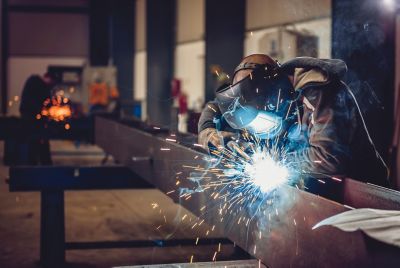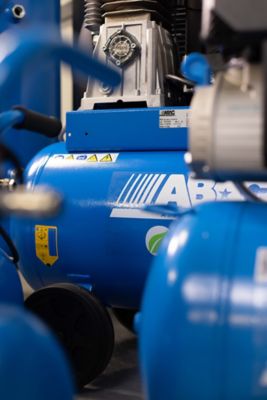Industrial Air Compressors for Performance and Efficiency

Powering Diverse Industries and Product Manufacturing
The industrial landscape is a complex realm, comprising various application areas and contexts. It goes without saying that industrial context includes several segments of application areas. The most common ones entail the manufacturing of individual parts as well as the creation of complete products. Installation flexibility and versatility is what makes compressed air one fundamental asset of industries. Discover more about implications of air compressors in product manufacturing. Choose from a wide range of industrial products, such as industrial air compressor or industrial rotary screw air compressor, for increased demand for compressed air.
Choosing the Right Power Supply for Your Industrial Air Compressor
When integrating compressed air into industrial facilities, one of the initial considerations is the power supply requirements. The choice of power system depends on the specific context. Industrial environments with high current demands often operate on a three-phase system (400 V), while smaller businesses might rely on a single-phase setup (230 V). The selection of your air compressor should align with the electrical configuration. A single-phase system can efficiently power air compressors with engines up to 3 HP (2.2 kW), whereas a three-phase system can handle air compressors with higher capacities, particularly when amperage requirements reach certain levels.
Managing Sound Levels: A Crucial Factor in Air Compressor Selection
When choosing the right air compressor for your industrial facility, carefully assessing the sound level generated by the compressed air generator is essential. This consideration becomes even more critical when space limitations prevent the allocation of a dedicated room for the airflow system. But what exactly do we mean by sound level?
- Sound power level: This metric quantifies the energy released by a sound source within a defined unit of time.
- Sound pressure: It measures the effect of a sound source's energy, or a group of sources, and is influenced by the distance from the source(s) as well as the acoustic properties of the environment.
Selecting a new air compressor requires a thorough evaluation of the acceptability of the sound level within your workplace. This parameter is instrumental in determining the activities associated with a particular noise level. For precise guidance on choosing the most suitable air compressor, it's advisable to consult with an expert in the field.
dBA |
Type of sound |
|---|---|
140 dBA |
Flight deck while take-off or landing |
120 dBA |
Whistle from 1 m distance |
Pain threshold, over this level the risk of ears damages is real |
|
115 dBA |
Take-off of an airplane from 10 m |
110 dBA |
Music sound level in a disco event |
105 dBA |
Chainsaw from 1 m distance |
100 dBA |
Pneumatic drill from 10 m distance |
95 dBA |
Desperate cry |
90 dBA |
Motorcyle from 6 m distance |
85 dBA |
Chainsaw from 2 m distance |
80 dBA |
Heavy traffic in highway from 25 m |
70 dBA |
Hairdryer from 1 m distance |
65 dBA |
Normal speech |
60 dBA |
Lawn mower |
55 dBA |
Television from 1 m distance |
50 dBA |
Fridge from 1 m distance |
45 dBA |
Light buzz |
35 dBA |
Silent fan |
25 dBA |
Breathe from 1 m distance |
Applications of Industrial Air Compressors
Air compressors are invaluable assets in industrial settings. Since powering equipment using compressed air is safer and more efficient than electricity, investing in the most suitable equipment for your industrial setting makes sense, and ABAC is here to help. We understand that industrial air compressors provide versatile power that can significantly speed up the production process.
Broad uses for air compressors in industrial settings include:
- Spraying: Industrial air compressors make it easy to apply layers of paint and other coatings evenly.
- Powering tools: Air tools are lighter, safer, and easier to use than electric tools. High-frequency welding applications can be easily completed with compressed air solutions.
- Pumping: Since air is stored under high pressure, it is a ready source of power that can be used for a variety of applications. Facilities specialized in hydraulic pump combinations; any crane trucks can benefit greatly from hydraulic pumps being separated from engines.
- Manufacturing: Air compressors are essential for tool power, stamping, and cleaning in general manufacturing industry applications.
- Inflating: Air compressors make it easy to inflate anything from tires to safety equipment, including emergency evacuation chutes.
- Breaking: Air compressors can act as powerful generators, generating power for maintenance tasks. Heavy-duty industrial air compressors can effectively break up concrete and paving.
Each industrial setting and business is unique, and choosing the right equipment requires careful consideration of the power supply, sound levels, unit size, and output requirements. ABAC offers a range of heavy-duty industrial air compressor equipment options. Our comprehensive range of air compressors for industrial use includes:
- Stationary air compressors: Piston air compressors designed for industrial and commercial settings
- Rotary screw compressors: Heavy-duty industrial air compressor solutions ideal for automotive and industrial applications that require a continuous supply of compressed air
















